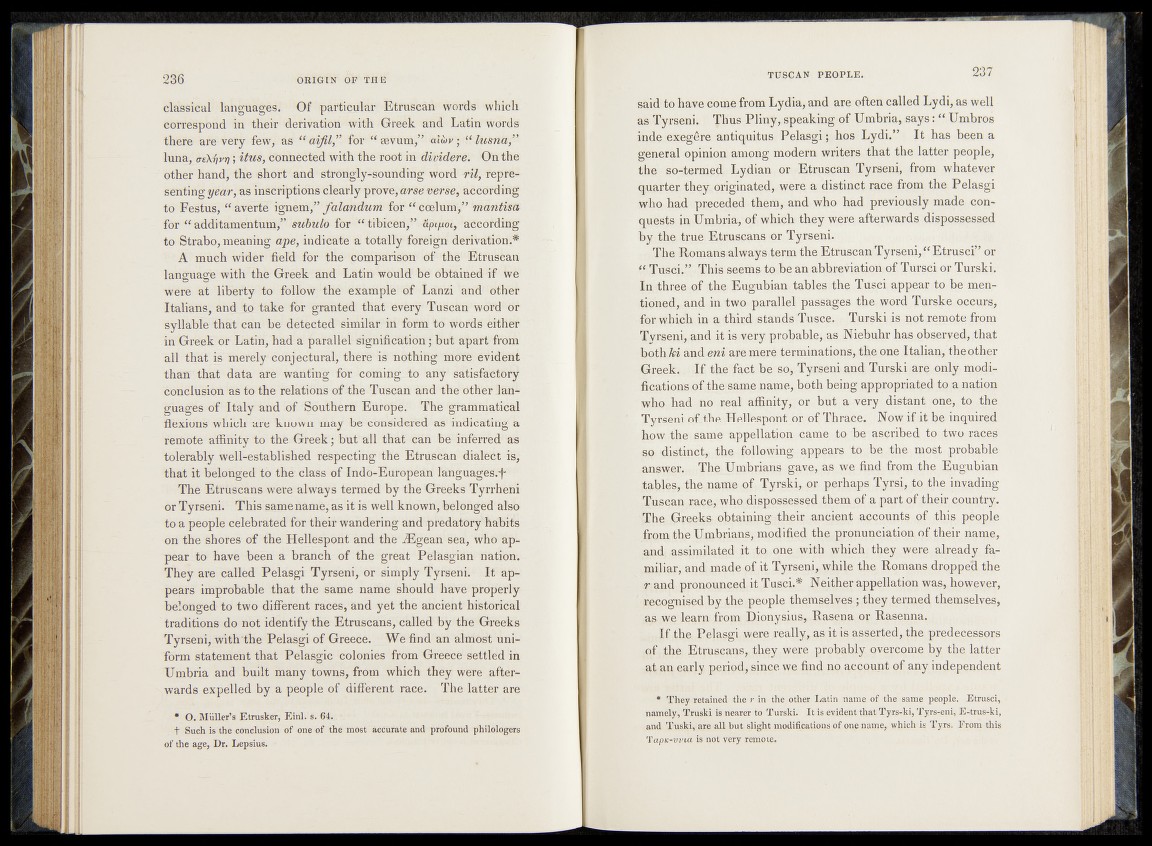
classical languages.- Of particular Etruscah words which
correspond in their derivation -with Greèk dnd Latin wdrds
there are very few, as' “ aifil,” for sevum,” cdètv; ‘‘ lusna,”
luna, aekijvi) ; itus, connected with the root in dividere. On the
other hand, the short and strongly-sounding word ril, representing
year, as inscriptions clearly prove, arse verse, according
to Festus, “ averte ignem,” falandum for “ cesium,” mantisa
for “ addi tarnen turn,” subulo for “ tibicenj” Api/iot, according
to Strabo, meaning ape, indicate a totally foreign derivation.*
A much wider field for the comparison of the’ Etruscan
language with the Greek and Latin would be obtained if we
wéré at liberty to follow: the example óf Lanzi 'aiid^otbet
Italians, and to take for granted that every Tuscan word or
Syllable th a t can be detected similar in form to Words ëitHër
in Greek or Latin, had a parallel signification; but’^part from
all that ia merely conjectural, therë 'is nothihg- ihorë évident
than that data are wanting for coming-to any satisfactory
conclusion as to the relations of the Tuscan and the ötfelÉÉteh1-
guagtes of Italy and of Southern Europe.- The grammatical
flexions which are known may be considered as TnUicating a
remote affinity to the Greek; but all that can be inferred as
tolerably well-established respecting the Etruscan diaïêét isV
that it belonged to the- class of Indo-European Miguages/f’' •
The Etruscans were always termed by the Greeks1 Tyrfhèhi
or Tyrseni. This same name, as it is well known, belonged' also
to a people celebrated for their wandering and prèdatöry habits
on the shores of the Hellespont and the jEgeah' ëea, Who appear
to have been a branch of the great Pelasgidn nation.
They are called Pelasgi Tyrseni, or simply Tyrsenk , It appears
improbable that the same name should have properly
belonged to two different races, and yet the ancient historical
traditions do not identify the Etruscans, called by the Greeks
Tyrseni, w ith'the Pelasgi of Greece. We find an almost uniform
statement that Pelasgic colonies from Greece settled in
Umbria and built many towns, from which they were afterwards
expelled by a people of different race. The latter are
* O. Muller’s Etrusker, Einl. s. 64... \
+ Such is thé conclusion ó f one of the most accurate and profound philologers
of the age, Dr. Lepsius.
said to have come from Lydia, and are often called Lydi, as well
as Tyrseni. Thus Pliny, speaking ofiUmbria, says: “ Umbros
inde exeg^re antiquitus. Pelasgi; bos Lydi*” I t has been a
general opinion among modern writers that the latter people,
the so-,termed Lydian or Etruscan Tyrseni, from whatever
quarter they..originated, were a distinct race from the Pelasgi
who had preceded them, and who had previously made conquests
in Umbria, o f which- they were afterwards dispossessed
by ,fthe- trpp Etruscans or Tyrseni."
The Romans always .term the Etruscan Tyrseni, “ Etrusci” or
((Tusci.” This seems to„be an abbreviation.of.Tursci or Turski.
In threq.qf'Jthe-Eugubian tablesrthe Tusci. appear to be mentioned,
and in two parallel passages the, word Turske oc.curs,
forwhich in a third stands Tusce.} Turskids^ot remote frpm
Tyrseni, and itis^yery probablej^s-ifiebuhr hasobseryed, that
both k i and eni are mere terminations, the one Italian, the other
Greeks If the'fact be so, Tyrseni-and Turski are only modi-
ficatiqpeqf the^same name, both being appropriated to ,a nation
who-had no^eal affinity, or but a. very r distant .one, to the
Tyrseni pfAhe Hklltespont’b^bf T h raCf^Nowif it be inquired
how then same appellation ,c^me tq jh ^ ^ F ib e d two races
•sp dMipct, following, appears to be the most probable-
answer. The^Upbriuns gave, as we fin>d from.the iE^gjubian
tables,, thepapie of Tyrski, o,r perhaps Tyrsi, to the iny^ding
, Ti^qan^aeq, who dispossessed .them of ,a p art phtheir.country.
The.?ifxyeeks obtaining;jfheir ancient accounts of this people
from tb.e Umbrians, modified the^prpnunciation of t,heir name,
and, assimila^d it ,tor one with phjch|they \y.ere?p.lready fa,-
miliar, and.,made of.it Tyrseni, while the Romaps dropped, the
r an4vpfonopne.e4 it Tusci,.* ^f^ther appellation was, however,
' Recognised,by ifhe people thpmselyq®,;? thpy^te^ed themselves,
We learn from Dionysius, Rasena or Rasenna.
, s j I f «the,; .really, as it ij£ap§grted, the predpcqs^prs
yof^ the Etruspa!ns,, theyiweremrqb^hly>qv~ercqme .by the latter
at an early period, siqqe we find no Recount of any independent
* They-retained the r-in the,other Latin tfatiie.'of’-the same people. Etrusci,
namely, Truski is nearer to Turski. It is.evident that Tyrs-ki, Tyrs-eni, E-trus-ki,
and Tyski, are all hut slight modifications of one name, which is Tyrs. From this
T a p K - v ih d is not very remote.